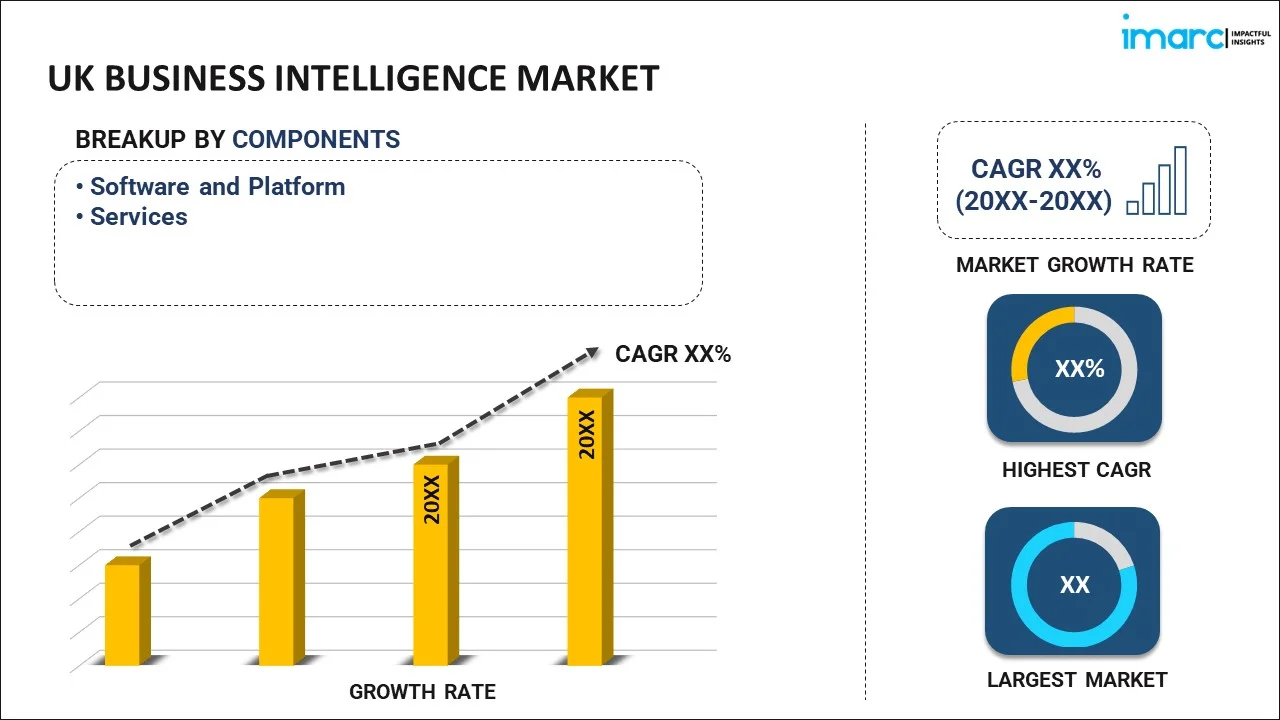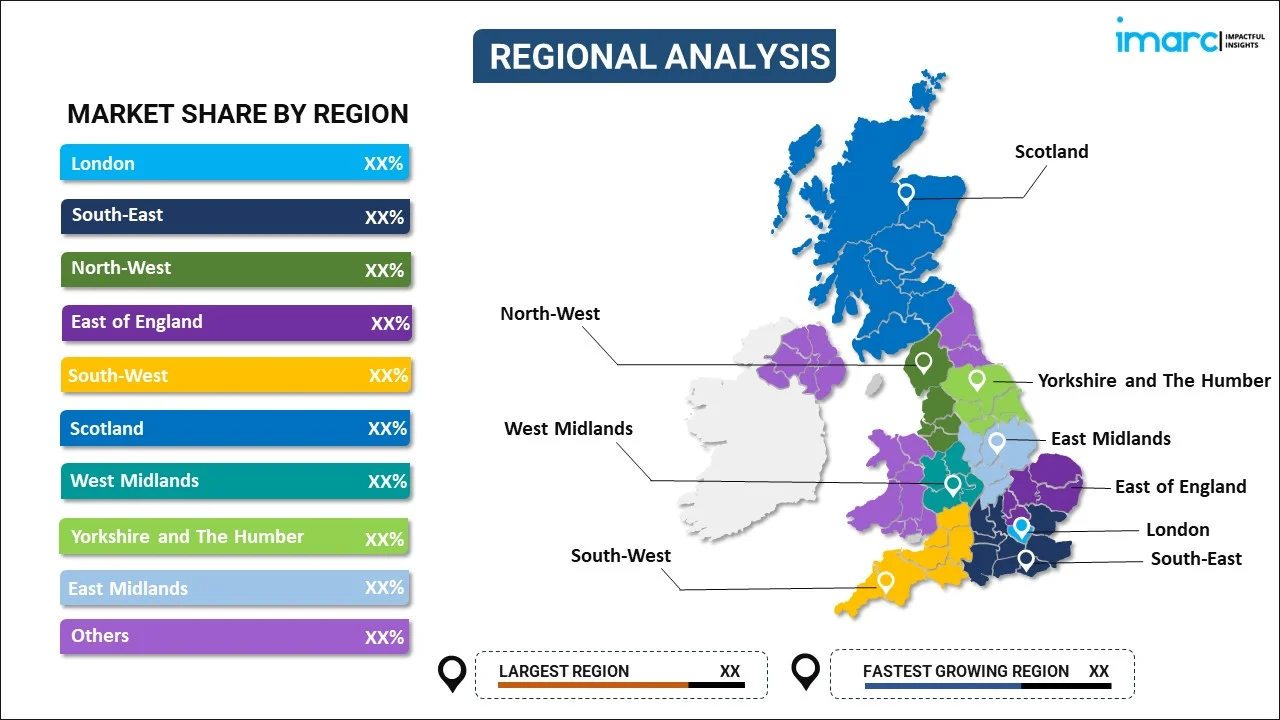
UK Business Intelligence Market Report by Component (Software and Platform, Services), Deployment (On-premises, Cloud-based), Organization Size (Large Enterprises, Small and Medium-Sized Enterprises), End Use Industry (BFSI, IT and Telecommunication, Retail, Healthcare, and Others), and Region, 2026-2034
UK Business Intelligence Market Overview:
The UK business intelligence market size reached USD 1.2 Billion in 2025. Looking forward, IMARC Group expects the market to reach USD 3.0 Billion by 2034, exhibiting a growth rate (CAGR) of 10.85% during 2026-2034. The increasing demand for data-driven decision-making, widespread adoption of cloud-based BI solutions, heightened focus on customer insights and personalization, stringent regulatory compliance requirements, and efforts to enhance operational efficiency and reduce costs are some of the factors contributing to the UK business intelligence market share. The market is expanding across healthcare, finance, and retail, with growing adoption of AI-driven tools for predictive analytics, risk assessment, customer insights, and operational decision-making.
|
Report Attribute
|
Key Statistics
|
|---|---|
|
Base Year
|
2025
|
|
Forecast Years
|
2026-2034
|
|
Historical Years
|
2020-2025
|
|
Market Size in 2025
|
USD 1.2 Billion |
|
Market Forecast in 2034
|
USD 3.0 Billion |
| Market Growth Rate 2026-2034 | 10.85% |
Access the full market insights report Request Sample
UK Business Intelligence Market Trends:
Healthcare driving BI innovation
Predictive analytics is gaining traction in the UK healthcare sector, with business intelligence platforms adapting to meet rising demand for data-driven decision-making. As NHS trusts and private providers seek to improve patient outcomes and reduce costs, the use of AI-powered forecasting tools is becoming more common. These tools support early diagnosis, resource planning, and risk assessment by analyzing patient records, treatment patterns, and demographic data. UK-based business intelligence firms are integrating healthcare-specific modules, offering solutions that blend clinical insights with financial risk modeling. The UK business intelligence market growth is supported by government initiatives promoting digital health and growing interest from insurers and care networks. With data privacy and system interoperability as ongoing challenges, firms with secure, scalable platforms are positioning themselves as key enablers in this shift. The trend reflects a broader move toward applying commercial data strategies in public health settings to improve service efficiency and responsiveness.
Increasing demand for data-driven decision making
In the business intelligence market UK, with increasing competition in different industries, data has become a crucial tool for decision-making. Many business entities are now appreciating the benefits of deriving valuable insights from raw data to enhance the productivity of their operations and experiences of the customers and the overall success of the firm. The exponential growth of big data together with the technologies of data analytics has provided opportunities for firms to generate, process as well as analyses big data in real time. Besides, the association of BI instruments with artificial knowledge and machine learning techniques more precisely provides an opportunity for better data analysis, prediction, and decision automation. This trend can be especially observed in the spheres of finances, medicine, retail, and industrial production, where information is essential for efficiency, risk, and customer relationship management. There is an increased interest in investing in BI solutions, which is supporting the United Kingdom business intelligence market.
Growing adoption of cloud-based BI solutions
Cloud computing offers several advantages over traditional on-premises BI systems, including scalability, flexibility, and cost-effectiveness. Businesses are increasingly migrating their data and analytics operations to the cloud to benefit from these advantages. Cloud BI solutions provide a scalable BI option that enables any business to avoid massive upfront investments along with ongoing maintenance costs related to on-premises BI infrastructure. Cloud Business Intelligence (BI) solutions significantly enhance the accessibility of data from any location, thereby addressing the needs of remote work and collaboration, which are increasingly pertinent in the contemporary business landscape. Consequently, subscription-based cloud BI services are particularly advantageous as they lower entry barriers associated with initial costs, making them ideal for small to medium-sized enterprises. Furthermore, leading cloud service providers ensure a high level of security and maintain compliance certifications, thereby addressing concerns related to data privacy and security effectively. At the same moment, the importance of BI technologies is elevated a step higher when integrated with various other cloud-based systems like CRM and ERP. Based on UK business intelligence market analysis, these systems ensure data flow across all the business functions and also provide improved analytics on the same platform.
UK Business Intelligence Market Segmentation:
IMARC Group provides an analysis of the key trends in each segment of the market, along with forecasts at the country level for 2026-2034. Our report has categorized the market based on component, deployment, organization size, and end use industry.
Component Insights:

To get detailed segment analysis of this market Request Sample
- Software and Platform
- Services
The report has provided a detailed breakup and analysis of the market based on the component. This includes software and platform and services.
Deployment Insights:
- On-premises
- Cloud-based
A detailed breakup and analysis of the market based on the deployment have also been provided in the report. This includes on-premises and cloud-based.
Organization Size Insights:
- Large Enterprises
- Small and Medium-Sized Enterprises
A detailed breakup and analysis of the market based on the organization size have also been provided in the report. This includes large enterprises and small and medium-sized enterprises.
End Use Industry Insights:
- BFSI
- IT and Telecommunication
- Retail
- Healthcare
- Others
A detailed breakup and analysis of the market based on the end use industry have also been provided in the report. This includes BFSI, IT and telecommunication, retail, healthcare, and others.
Regional Insights:

To get detailed regional analysis of this market Request Sample
- London
- South East
- North West
- East of England
- South West
- Scotland
- West Midlands
- Yorkshire and The Humber
- East Midlands
- Others
The report has also provided a comprehensive analysis of all the major regional markets, which include London, South East, North West, East of England, South West, Scotland, West Midlands, Yorkshire and The Humber, East Midlands, and Others.
Competitive Landscape:
The market research report has also provided a comprehensive analysis of the competitive landscape. Competitive analysis such as market structure, key player positioning, top winning strategies, competitive dashboard, and company evaluation quadrant has been covered in the report. Also, detailed profiles of all major companies have been provided.
UK Business Intelligence Market News:
- In April 2025, Datatonic, a prominent cloud data and AI solutions provider, has announced its strategic acquisition of Syntio, a specialist in data engineering. This move significantly bolsters Datatonic's offerings within the dynamic UK business intelligence market. The acquisition integrates Syntio's deep data engineering capabilities, including data ingestion, transformation, and business intelligence, with Datatonic's existing AI-driven services. This expansion aims to meet the increasing demand for advanced, cloud-based BI solutions, leveraging AI for enhanced data-driven decision-making across various sectors.
- In March 2025, Equifax UK launched the Business Intelligence Suite, a set of cloud-native tools designed for commercial lenders. Built on its commercial data platform, the suite includes AI-driven features like Turnover Forecast, Business Foresight, and Recovery Radar. These tools aim to speed up credit decisions, validate trading activity, and improve debt recovery. Equifax is the first UK credit reference agency with fully cloud-native commercial data capabilities.
- In February 2025, Oxford Economics invested GBP 2 Million in The Data City, a UK-based real-time company classification platform. The funding, based on a GBP 19 Million post-money valuation, would boost its AI tech and support global growth. The partnership highlights increasing demand in the UK for precise, real-time AI-driven business intelligence solutions.
- In May 2024, Oracle introduced new AI-powered skills solution to help organizations drive employee and business growth. Oracle grow for business leaders connects all talent information from across the enterprise to provide leaders with a unified solution to effectively support skills development, maximize employee growth, and improve business success.
- In May 2023, SAS announced the investment of $1 billion over the next three years to further develop advanced analytics solutions targeted at the unique needs of specific industries. Through this investment, SAS will continue to support companies using AI, machine learning and advanced analytics to fight fraud, manage risk, and better serve customers and citizens.
UK Business Intelligence Market Report Coverage:
| Report Features | Details |
|---|---|
| Base Year of the Analysis | 2025 |
| Historical Period | 2020-2025 |
| Forecast Period | 2026-2034 |
| Units | Billion USD |
| Scope of the Report | Exploration of Historical Trends and Market Outlook, Industry Catalysts and Challenges, Segment-Wise Historical and Future Market Assessment:
|
| Components Covered | Software and Platform, Services |
| Deployments Covered | On-premises, Cloud-based |
| Organization Sizes Covered | Large Enterprises, Small and Medium-Sized Enterprises |
| End Use Industries Covered | BFSI, IT and Telecommunication, Retail, Healthcare, Others |
| Regions Covered | London, South East, North West, East of England, South West, Scotland, West Midlands, Yorkshire and The Humber, East Midlands, Others |
| Customization Scope | 10% Free Customization |
| Post-Sale Analyst Support | 10-12 Weeks |
| Delivery Format | PDF and Excel through Email (We can also provide the editable version of the report in PPT/Word format on special request) |
Key Benefits for Stakeholders:
- IMARC’s industry report offers a comprehensive quantitative analysis of various market segments, historical and current market trends, market forecasts, and dynamics of the UK business intelligence market from 2020-2034.
- The research report provides the latest information on the market drivers, challenges, and opportunities in the UK business intelligence market.
- Porter's five forces analysis assist stakeholders in assessing the impact of new entrants, competitive rivalry, supplier power, buyer power, and the threat of substitution. It helps stakeholders to analyze the level of competition within the UK business intelligence industry and its attractiveness.
- Competitive landscape allows stakeholders to understand their competitive environment and provides an insight into the current positions of key players in the market.
Key Questions Answered in This Report
We expect the UK business intelligence market to exhibit a CAGR of 10.85% during 2026-2034.
The UK business intelligence market is driven by increasing demand for data-driven decision-making, widespread adoption of cloud-based solutions offering scalability and cost-effectiveness, and the integration of AI/ML for advanced analytics. A growing need for operational efficiency and a focus on customer insights also play key roles.
Based on the component, the UK business intelligence market has been segregated into software and platform and services.
Based on the deployment, the UK business intelligence market has been segregated into on-premises and cloud-based.
Based on the organization size, the UK business intelligence market has been segregated into large enterprises and small and medium-sized enterprises.
Based on the end use industry, the UK business intelligence market has been segregated into BFSI, IT and telecommunication, retail, healthcare, and others.
On a regional level, the market has been classified into London, South East, North West, East of England, South West, Scotland, West Midlands, Yorkshire and the Humber, East Midlands, and others.
Need more help?
- Speak to our experienced analysts for insights on the current market scenarios.
- Include additional segments and countries to customize the report as per your requirement.
- Gain an unparalleled competitive advantage in your domain by understanding how to utilize the report and positively impacting your operations and revenue.
- For further assistance, please connect with our analysts.
 Request Customization
Request Customization
 Speak to an Analyst
Speak to an Analyst
 Request Brochure
Request Brochure
 Inquire Before Buying
Inquire Before Buying




.webp)




.webp)












